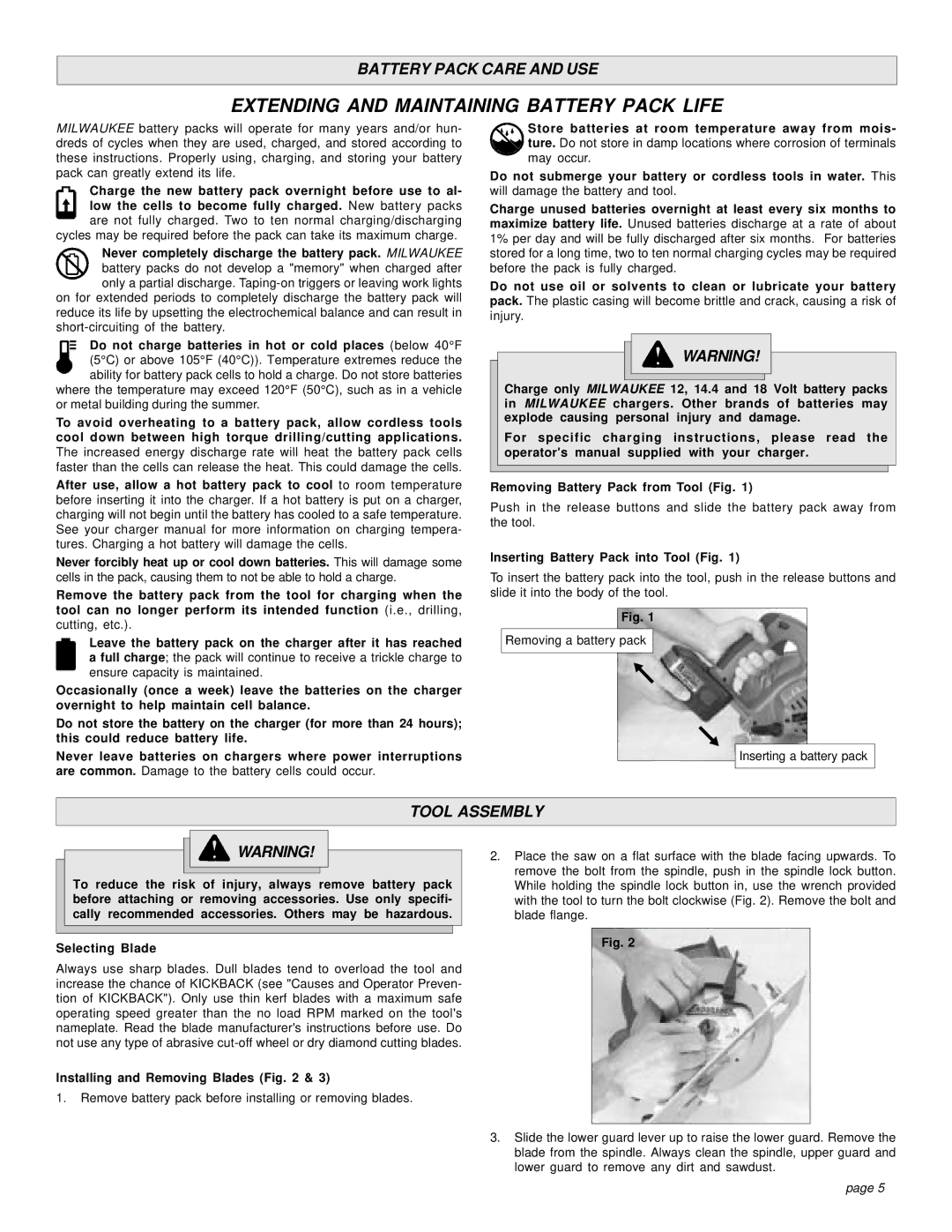
BATTERY PACK CARE AND USE
EXTENDING AND MAINTAINING BATTERY PACK LIFE
MILWAUKEE battery packs will operate for many years and/or hun- dreds of cycles when they are used, charged, and stored according to these instructions. Properly using, charging, and storing your battery pack can greatly extend its life.
Charge the new battery pack overnight before use to al- low the cells to become fully charged. New battery packs are not fully charged. Two to ten normal charging/discharging
cycles may be required before the pack can take its maximum charge.
Never completely discharge the battery pack. MILWAUKEE battery packs do not develop a "memory" when charged after only a partial discharge.
on for extended periods to completely discharge the battery pack will reduce its life by upsetting the electrochemical balance and can result in
Do not charge batteries in hot or cold places (below 40°F (5°C) or above 105°F (40°C)). Temperature extremes reduce the ability for battery pack cells to hold a charge. Do not store batteries where the temperature may exceed 120°F (50°C), such as in a vehicle
or metal building during the summer.
To avoid overheating to a battery pack, allow cordless tools cool down between high torque drilling/cutting applications. The increased energy discharge rate will heat the battery pack cells faster than the cells can release the heat. This could damage the cells.
After use, allow a hot battery pack to cool to room temperature before inserting it into the charger. If a hot battery is put on a charger, charging will not begin until the battery has cooled to a safe temperature. See your charger manual for more information on charging tempera- tures. Charging a hot battery will damage the cells.
Never forcibly heat up or cool down batteries. This will damage some cells in the pack, causing them to not be able to hold a charge.
Remove the battery pack from the tool for charging when the tool can no longer perform its intended function (i.e., drilling, cutting, etc.).
Leave the battery pack on the charger after it has reached a full charge; the pack will continue to receive a trickle charge to ensure capacity is maintained.
Occasionally (once a week) leave the batteries on the charger overnight to help maintain cell balance.
Do not store the battery on the charger (for more than 24 hours); this could reduce battery life.
Never leave batteries on chargers where power interruptions are common. Damage to the battery cells could occur.
Store batteries at room temperature away from mois- ture. Do not store in damp locations where corrosion of terminals may occur.
Do not submerge your battery or cordless tools in water. This will damage the battery and tool.
Charge unused batteries overnight at least every six months to maximize battery life. Unused batteries discharge at a rate of about 1% per day and will be fully discharged after six months. For batteries stored for a long time, two to ten normal charging cycles may be required before the pack is fully charged.
Do not use oil or solvents to clean or lubricate your battery pack. The plastic casing will become brittle and crack, causing a risk of injury.
WARNING!
Charge only MILWAUKEE 12, 14.4 and 18 Volt battery packs in MILWAUKEE chargers. Other brands of batteries may explode causing personal injury and damage.
For specific charging instructions, please read the operator's manual supplied with your charger.
Removing Battery Pack from Tool (Fig. 1)
Push in the release buttons and slide the battery pack away from the tool.
Inserting Battery Pack into Tool (Fig. 1)
To insert the battery pack into the tool, push in the release buttons and slide it into the body of the tool.
Fig. 1
Removing a battery pack
Inserting a battery pack
TOOL ASSEMBLY
![]() WARNING!
WARNING!
To reduce the risk of injury, always remove battery pack before attaching or removing accessories. Use only specifi- cally recommended accessories. Others may be hazardous.
Selecting Blade
Always use sharp blades. Dull blades tend to overload the tool and increase the chance of KICKBACK (see "Causes and Operator Preven- tion of KICKBACK"). Only use thin kerf blades with a maximum safe operating speed greater than the no load RPM marked on the tool's nameplate. Read the blade manufacturer's instructions before use. Do not use any type of abrasive
Installing and Removing Blades (Fig. 2 & 3)
1.Remove battery pack before installing or removing blades.
2.Place the saw on a flat surface with the blade facing upwards. To remove the bolt from the spindle, push in the spindle lock button. While holding the spindle lock button in, use the wrench provided with the tool to turn the bolt clockwise (Fig. 2). Remove the bolt and blade flange.
Fig. 2
3.Slide the lower guard lever up to raise the lower guard. Remove the blade from the spindle. Always clean the spindle, upper guard and lower guard to remove any dirt and sawdust.
page 5
